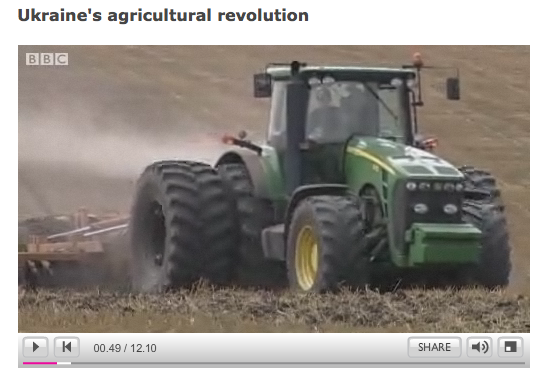Earlier this week BBC’s Newsnight aired an extended feature on how overseas farmers are bringing the investment that’s transforming Ukraine’s agriculture into vast arable mega-farms. There is no doubt that Ukraine, with its vast expanses of fertile land, has the potential to make a valuable contribution to the global supply of food. Let’s hope they avoid the mistakes made in industrial monoculture farming elsewhere in the world. And that some of the profits that are being made end up in the hands of ordinary Ukrainians.
View the feature here
 … Read the rest
… Read the rest
EU farmers drive Ukraine’s agricultural revolution
Earlier this week BBC’s Newsnight aired an extended feature on how overseas farmers are bringing the investment that’s transforming Ukraine’s agriculture into vast arable mega-farms. There is no doubt that Ukraine, with its vast expanses of fertile land, has the potential to make a valuable contribution to the global supply of food. Let’s hope they avoid the mistakes made in industrial monoculture farming elsewhere in the world. And that some of the profits that are being made end up in the hands of ordinary Ukrainians.
Timetable for the next 'truly big' CAP reform
Roger Waite, one of the sharpest analysts of EU farm policy writes at farmpolicy.com on the timetable for the next CAP reform. Definitely worth reading.
“Analysis from Brussels”- by Roger Waite- Towards the Next, Truly Big CAP Reform- The Timetable … Read the rest
Timetable for the next ‘truly big’ CAP reform
Roger Waite, one of the sharpest analysts of EU farm policy writes at farmpolicy.com on the timetable for the next CAP reform. Definitely worth reading.
“Analysis from Brussels”- by Roger Waite- Towards the Next, Truly Big CAP Reform- The Timetable … Read the rest
Tackling the new (old) productivism
This afternoon I did a pre-recorded interview with BBC Radio 4’s Farming Today programme. The subject was the House of Lords report on the 2010 EU budget, which says too much money is being spent on agriculture. The first question I was asked by the presenter shows how deeply the new (old) productivism has taken root over the past year. I was asked something along the lines of “Given the fears about food security, don’t we need a well-funded agriculture sector?”.… Read the rest
New BBC documentary series: The Future of Food
Last night, BBC2 screened the first of six hour-long episodes in a new documentary series, The Future of Food.
 … Read the rest
… Read the rest
Big Phil Lays It On The Line
Vaasa, Finland: Philip Lowe is a leading figure in the rural studies community in the UK and he issues a stark warning about the so-called ‘new productivism’ in an interview that was issued to delegates at the ESRS Congress where he gave the opening plenary.… Read the rest
UK House of Lords reviews 2010 EU draft budget
In a recent report, the UK House of Lords European Committee criticised the European Commission’s proposals for the 2010 European Communities budget for maintaining a very high level of spending on agriculture, and failing to shift adequate resources to stimulus measures to aid economic recovery. It expressed frustration that, in the middle of an economic crisis, the proportion of the budget going to agriculture remained so large.
It identified a particular problem for the funding of the second tranche of the European Economic Recovery Programme. This was the stimulus package of €5 billion agreed in March 2009, of which €2.6 billion was to be funded from the 2009 budget and €2.4 billion from the 2010 budget.… Read the rest
Addressing the dairy crisis – is US intervention buying a good thing for EU producers?
Today, the US raised its intervention support prices for some dairy products as a way of supporting the US farm price for milk. The support price for skimmed milk powder was increased by 15 percent and for cheddar cheese by 16 per cent for a limited 3-month period. Immediately milk prices on the Chicago Mercentile Exchange increased by 5 per cent, and it is estimated that the measure will add $243 million to US dairy farm incomes in the current year.
From a European perspective, this measure has ambiguous effects and may even be welcomed for its short-run effects. In the short run, the Commodity Credit Corporation will enter the market as an additional buyer, raising the floor price of milk.… Read the rest
Where to find data on EU export refunds?
Recently, I was looking for an internet source for EU export refunds – not overall expenditure, but the refund rates for individual commodities by month. What I was hoping to find was an Excel worksheet which set out this information, but it seems extraordinarily hard to come by. The nearest I could get was the excellent webpage on export refunds for milk and meat products maintained by OFIVAL, the French marketing agency. However, the data here take the form of pdf files containing the information every time the refund levels are changed, and it would be extremely tedious to transfer this into an Excel file.… Read the rest
